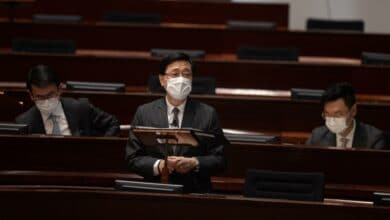Ecuador, a year in the legal labyrinth for abortion due to rape

Quito, Apr 28 (EFE).- The decriminalization of abortion in cases of rape has been going through an institutional labyrinth in Ecuador with the participation of the three branches of government and has frustrated feminist organizations, who a year ago hailed the historic ruling by the Constitutional Court and now are lamenting the fact that the resulting law is on the verge of going into effect.
The ruling, issued on April 28, 2021, decriminalized abortion in cases of rape, but at the same time it ordered the National Assembly, Ecuador’s parliament, and the government to draft a law to regulate it with a result that has been far from the expectations and advances hoped for by feminist organizations.
The regulation, which will be promulgated in the coming days, contains the modifications introduced by President Guillermo Lasso, a conservative and Catholic leader, who partially vetoed the text approved by the Assembly and made variations in 61 of its 63 articles.
“Symbolically, abortion is decriminalized, but operationally I don’t know,” the director of the Fundacion Desafio, Virginia Gomez De la Torre told EFE, her organization being one of the institutions that presented the lawsuit leading to the Constitutional Court ruling.
“The president’s partial veto fulfilled a type of premonition that we women had had that it was a risk to draft a law since it was probable that obstacles (to abortion access) would be put in its way,” said Gomez De la Torre, who added that this anniversary has “a bittersweet taste, but more bitter than sweet.”
“We didn’t think that the president would be able to change what the law protected and once again allow women to be criminalized, in the sense of hindering access to the right not to experience an unwanted pregnancy, the product of a crime like rape,” she added.
Among the changes implemented by Lasso is setting the term within which a pregnancy can be interrupted to the first 12 weeks of gestation, and not including the exception of 18 weeks that had initially been contemplated for girls, teenagers, indigenous women and those in rural areas who have been raped.
Lasso also established a series of requirements for getting an abortion after a presumed rape, including presenting a criminal complaint, a sworn declaration or the results of a medical exam verifying the rape, and authorized doctors to refuse to provide an abortion if it goes against their personal convictions.
In arguing his case, Lasso – who had said that he would abide by the court ruling despite the fact that his own conviction is to respect human life starting at conception – said that abortion after a rape is an exception and not a right.
In addition, feminist organizations are concerned that the president is raising the specter of infanticide, which is not included as a specific crime in Ecuador’s penal code, and this opens up the possibility that pregnant women who have obstetric emergencies that result in the loss of the fetus could be charged in cases where it cannot be determined if the medical intervention caused the abortion.
“The scenario is dark and disheartening because once again we’re seeing that the conservative position of contempt for women has not changed,” the head of Fundacion Desafio said.
Another point of concern for Gomez De la Torre is that, in his text, Lasso limits the implementation of this public policy to things for which there have been budgetary allocations and includes his “personal position” in the regulation, something that she called “state violence.”
“It’s an excellent example of how a president is behaving violently toward women from his position of power. He has assaulted five million Ecuadorian women of reproductive age. It’s a demonstration of patriarchal and machista power, because what he’s put in his veto is unconstitutional,” Gomez De la Torre said.
Although the changes introduced by Lasso could have been reversed by the Assembly if it had managed to secure a two-thirds vote – or the support of 92 lawmakers – to ratify the original text, the legislature allowed the deadline for doing this to pass and now the law will enter into force as per the president’s altered text.
Since the Constitutional Court issued its ruling at least 25 women have asked to interrupt their pregnancies because they were raped and so far 19 have been able to do so and four dropped their requests, according to the Public Health Ministry, although in three cases healthcare personnel initially refused to perform the abortions.
Among the requests filed in the second half of 2021, 12 were by girls ages 10-14, three by teens from 15-19, three were from women 20-29 and two from women 30 or older.
“As long as the law exists, we will have to see how to work so that women can get access to abortion for rape, but we’ve already announced that this law is not going to prevail for very long because we’re going to fight so it changes and really responds to the spirit of the ruling,” Gomez De la Torre said.
It will just be a question of days after the law goes into effect before organizations like Fundacion Desafio file lawsuits with the Constitutional Court claiming it is unconstitutional and working to try and get a more progressive and satisfactory statue on the books.
EFE
fgg/sm/rrt/bp





